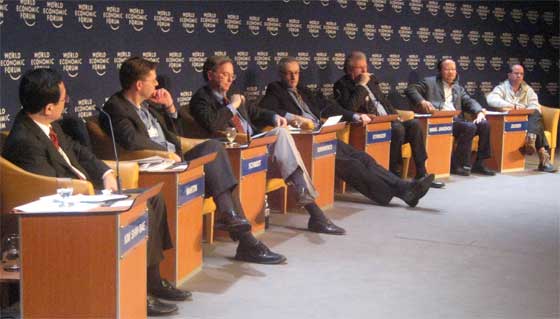
Fortune Senior Editor David Kirkpatrick led a power-packed session at Davos this afternoon called The Future of Mobile Technology. Panelists included Google CEO Eric Schmidt, FCC Chairman Kevin Martin, Sony CEO Sir Howard Stringer, NBC Universal CEO Jeff Zucker, SK Telecom CEO Kim Shin-Bae and China Mobile CEO Wang Jianzhou.
Kirkpatrick attempted to steer the conversation towards asian growth in mobile (China Mobile dominates the Chinese market and is adding 6 million new mobile subscribers per month, SK Telecom dominates Korea with more than 50% market share) and the bleak prospects for mobile advertising revenue. He quoted Forrester as saying that the U.S. mobile advertising market is projected to be under $1 billion even as far ahead as 2012. Today, he said, only 3% of Internet advertisers are putting display ads on mobile devices.
Google Android And The Mobile Tipping Point
Schmidt played down the revenue estimate, saying the tipping point in mobile had not been reached. When it does in the next year or so, he said, those revenue projections will be very low. He said his goal with Google’s new Android platform is to help the market reach that tipping point, and make money from mobile advertising along the way.
Schmidt also argued that mobile devices are potentially more interesting than PCs, since they have or will have GPS and other features that will allow for new kinds of applications, as well as location-based advertising. The key, he said, is that new services will be on an open platform with open standards (Android, of course), and that the new 700MHz spectrum rules permit it (they do, mostly). That sets the stage, he said, for a “huge revolution” in mobile. Without it, we have closed network “islands.”
Asian Growth: Mobile Devices Becoming Extension of Humanness
China Mobile CEO Wang Jianzhou noted that they have 317 million mobile customers in China today, and the total market is half a billion users. He said that people are using mobile devices as extensions of themselves to reach out to others via voice and SMS, and that if someone doesn’t have a mobile phone they will lack basic functions of what it is to be human.
His company is adding 6 million new subscribers per month. When asked if he is considering expansion outside of China, he replied that they have so much growth potential there that they are completely focused on that market.
NBC Sees Dollar Signs In Mobile, Sony Not So Much
Both Stringer (Sony) and Zucker (NBC) want to sell content to mobile users, but they have very different opinions on how effective they’ll be.
Zucker lamented the currently fragmented U.S. market, but seems optimistic that they’ll be able to move their merchandise effectively in the future (particularly short form video). He also said revenue splits need to change dramatically – today content creators are offered only 10% of revenue from sales, with the vast majority going to the carrier. Competition and openness will change this, he said.
Stringer was less optimistic, noting, for example, that Chinese customers don’t buy content, just blank CDs. “It won’t be easy to hang onto the price of content” he said, adding a quip: “When you defend the status quo when the quo has lost its status, you’re in trouble.” Stringer is highly charismatic and entertaining, but his distress came through clearly. At one point when someone asked him when new Sony OLED screen technology would come to mobile devices at a reasonable price point, he noted the high cost of production and joked “making a profit on consumer electronic devices is one of our goals.”
FCC Defends Its Compromise
FCC Chairman Kevin Martin defended their recent decision to partly open up the mobile market, but reject many of the key rules requested by Google.
For example, requiring network operators to sell access to others at wholesale rates would reduce their incentive to “upkeep the pipes.” Investment in infrastructure is key, he said, and forcing open networks could hurt the industry.
I asked Martin whether Google’s open letter put pressure on him and his commissioners to open up the spectrum rules. He said it didn’t, citing far more private pressure to keep things static from the existing carriers. It did give him a tool to help convince his commissioners to open up at least partially, he said.